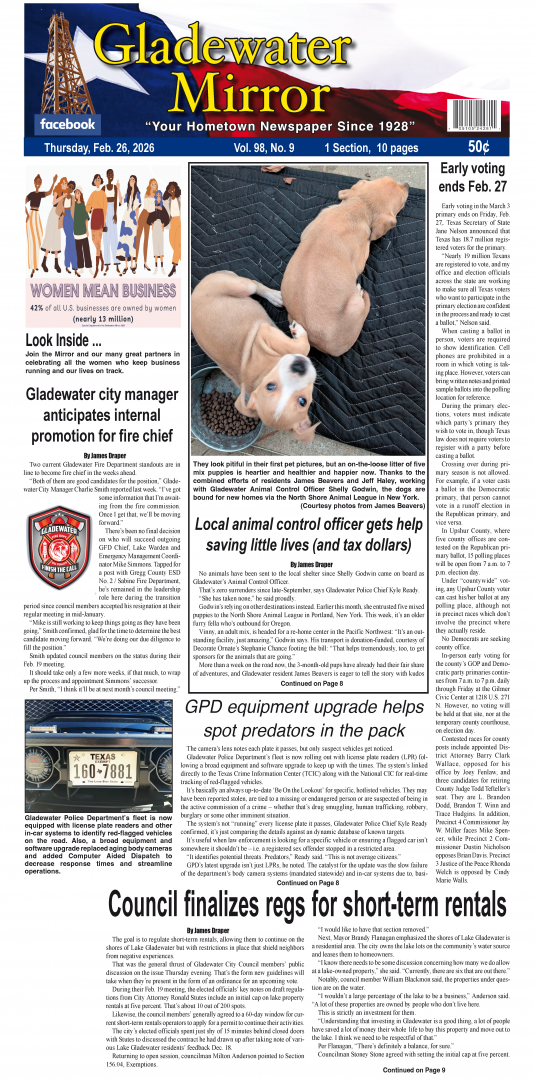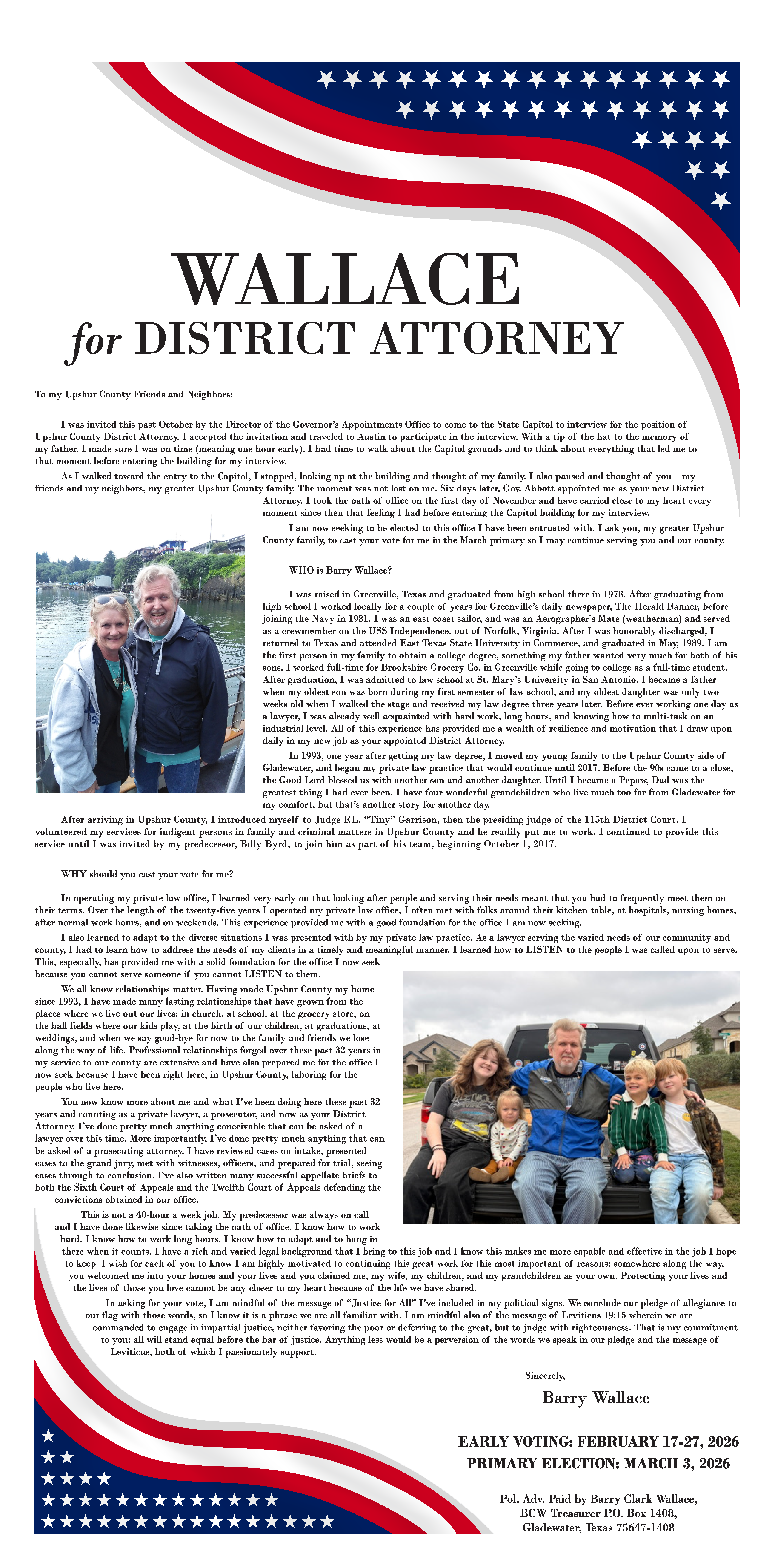Gladewater’s designation as ‘The Antique Capital of East Texas’ was never meant to be a reference to its charter.
First written and adopted in the mid-1950s, the city’s guiding document has been amended just twice – in November 1968 and August of ‘85. Almost 40 years since the last update, eight proposed amendments will be up for voter consideration May 4.
Suffice it to say, sections of the document are outdated and, in some places, actually contravene state law. (Local officials tend to ignore those antiquated sections to carry on business as usual.)
All that said, the proposed updates themselves are fairly pedantic, a little belated housekeeping for City Hall. There are some key changes in the list, however.
Baby steps, according to Gladewater Mayor Scott Owens; there’s no need to start from scratch, but the committee behind the proposed changes opted to keep the number to a minimum.
“We picked out the ones that we thought were the most important and crucial to get down.”
The most attention-grabbing changes relate to the city manager’s position – specifically, relaxing the requirement on how close the person must reside in proximity to the city limits and clarifying the municipal chain of command. There’s also a proposal to remove council members from office when they miss too many sessions.
The charter review committee included Owens as chair along with Gladewater ISD Superintendent Dr. Sedric Clark, former mayor and local business owner J.D. Shipp, banker Sam Cloud and Gladewater Mirror Publisher Jim Bardwell, who also sits on the board of Gladewater Economic Development Corporation.
“We wanted people with some governmental experience and oversight as well as citizenry and some business insight,” Owens noted.
After vetting by Gladewater City Council members, the eight amendments will be on the ballot alongside three council races (two of which are contested) during early voting later this month and on the Election Day, the first Saturday in May.
The first suggested amendment is to update the charter for gender neutrality.
“The charter was originally drafted in 1955. You had certain positions in that timeframe of tradition were male or female type of jobs,” Owens said. “In our modern era here, we know that male or female are doing most any job.
“Instead of going through in each little place and changing each job as male or female it was easier to put in the preamble here and say that if any pronoun references either male or female it was meant to be inclusive of either one.”
The second amendment effectively updates the charter’s election code.
“We are what is called a home-rule city, which means we can make up the rules that we self-govern by unless they are in conflict with (state law) and unless the legislature directs otherwise,” Owens noted. “Back in the day we were holding the elections in April” before the legislature consolidated polling in May and November.
Those election results have to be canvassed in due course, and it’s more efficient not to put a specific date to it: “We just stated it would be the first meeting after the election as dictated by state law.”
Amendment C covers excessive absences of council members and adds a consequence – if approved, an elected official forfeits the post after missing either three consecutive regular council meetings or six in any calendar year.
With no such provision in the code now, “We thought it would be good to address that, and we looked at other city charters that addressed that,” Owens said, following the City of Longview’s example.
The fourth amendment would officially extend the city judge’s appointment from a one-year term to two. The other portion relates to the office of city prosecutor.
Previously, “The city attorney was acting as prosecutor also in representing the city and the municipal court. For financial reasons in order to save money, we just hired a city prosecutor who just comes over for municipal court. But, we never allowed for it in the charter. We do appoint that prosecutor, and we do evaluate that prosecutor annually. We just needed to include that in the charter.”
Amendment E considers the city manager’s residency – if the change is approved, a manager may live within 30 miles of the Gladewater City Limits.
“This has come up before,” Owens said. “With the current housing situation, we have had candidates that we would have considered and would have been good city managers that already lived within the area,” but they were reticent to relocate into the city limits. Likewise, out-of-area candidates might not be able to find suitable housing inside Gladewater but would have more options in close proximity. “We want to get all the quality candidates we can.”
The sixth proposal clarifies the city’s chain of command, particularly that “The City of Manager shall be the chief executive officer and the head of the administrative branch of the city government,” with supervisory authority over all department heads, including council-appointed positions such as City Treasurer, City Attorney, City Judge, City Prosecutor and City Clerk. The council would retain the authority to appoint/remove those select positions.
“We just want to clarify the chain of command but still keep the checks and balances that the charter provides.”
The next amendment removes some specificity from the charter on fines so the regulations don’t conflict when costs change over time. They’re codified outside the charter in other city guidelines.
According to Owens, “There are certain things that are going to be in state law that are going to be a mandated range or a mandated fee or fine. Instead of putting an arbitrary figure in there that will change in value over time, we just want to do that we can never go over what is the maximum allowable in state law.”
The final amendment again removes outdated specificity in the charter, eliminating instructions on how to use now-defunct voting equipment and, again, adding general language that the city will follow state law.
“That just goes back to how technology changes over time,” Owens explained. Since the charter was written and last updated, “We’ve had hanging chads, we’ve had electronic ballots, we’ve had paper… This is just to say the voting is going to be consistent with state law, which we’d have to anyway.”
Owens agrees none of the proposed changes are particularly substantial, but the committee feel’s they’re necessary to help the city run a bit more smoothly and in full compliance with state law and best practices.
It’s just a start, he added: “I’m not saying that we will not come back next year or the year after with some other little changes.”
– By James Draper








